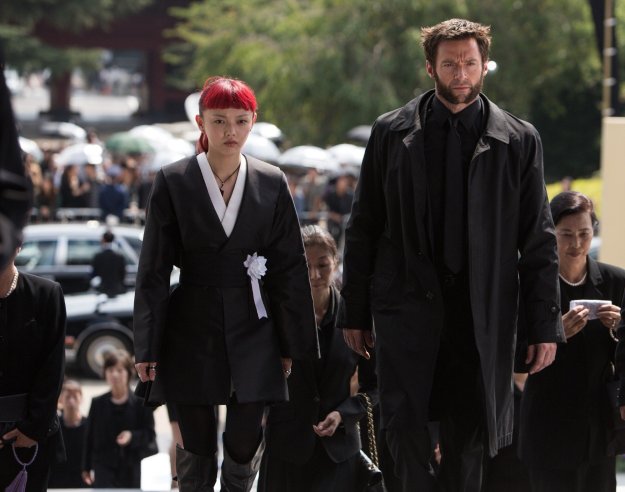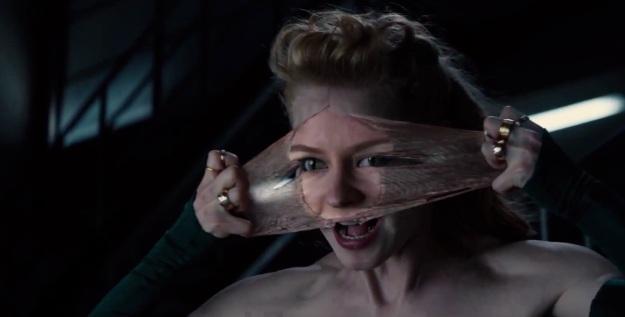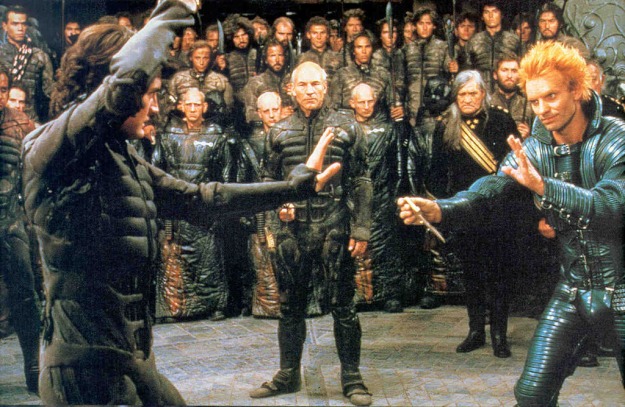As the years have ticked by, the landscape of cinematic super-heroics has changed remarkably. We have a new Spider-Man, Marvel has launched and maintained a fantastically successful movie universe, and DC looks to launch their own (presumably less) successful movie universe, but, thirteen years later, Hugh Jackman still plays Wolverine. The Wolverine marks the sixth time Jackman has portrayed the clawed Canadian, and the second time starring in a solo feature (arguably the fifth time). Based (very loosely) on the classic limited series Wolverine by Chris Claremont and Frank Miller, this film sees Wolverine go to Japan and engage in some good old-fashioned violence and engage a fair amount of brooding over his immortality. The Wolverine is directed by Jamed Mangold and stars Tao Okamoto, Hiroyuki Sanada, Rila Fukushima, Svetlana Khodchenkova, Will Yun Lee, Brian Tee, and Famke Janssen alongside Jackman.
Wolverine (aka Logan) is a man with one hell of a past, he just can’t remember most of it, and, unfortunately for him, the aspects he actually manages to remember plague him with nightmares (mostly featuring the deceased Jean Grey). Following the events of X-Men: The Last Stand (in which Cyclops, Jean Grey, and Professor X died, and that is all we will say about that film), Wolverine has taken to living alone in the wilderness and doing a somewhat decent impersonation of Grizzly Adams (he has one hell of a beard). He also befriends a grizzly bear.
Eventually, he is tracked down by Yukio (Rila Fukushima), a young Japanese martial artist who has sought the hairy mutant on behalf of her employer, Yashida, a man Wolverine saved from the atomic blast at Nagasaki. What Wolverine believes will be a brief foray to Tokyo to say goodbye to a man from his past turns into a fight for survival as he flees from Yashida’s enemies with Mariko, Yashida’s lovely granddaughter. Oh, and his healing factor is severely weakened for a while by a devious mutant named Viper (Svetlana Khodchenkova) who is snakelike in more ways than one.
Let me get this out of the way first, Hugh Jackman does his typically competent work as Wolverine, despite being too good-looking to play the role (a damning indictment if there ever was one). Hugh Jackman portrays the deep longing, the brutality he barely holds beneath the surface, and the desperation for something other than violence that characterizes Wolverine extremely well, even if the movie doesn’t quite live up to the standard he sets (X-Men Origins: Wolverine didn’t either, so hooray for consistency!).
A pair of Japanese models make their feature film debuts in leading roles and they are both up to the task. Tao Okamoto does very well with her rather one-note role as Mariko Yashida, Wolverine’s love interest and a relative of just about everyone villainous in the film. Rila Fukushima is also solid as Yukio, even if the role isn’t particularly well written. Jackman has good romantic chemistry with Okamoto, and a believable friendly rapport with Fukushima.
In fact, most of the supporting cast actually manages to do good work with what the script gives them. Hiroyuki Sanada is suitably malicious as Shingen Yashida, a very ambitious and ruthless businessman and Mariko’s father. Will Yun Lee is decent as Kenuichio Harada, a former flame of Mariko’s, a sworn protector of the Yashida clan, and a flip-flopper of epic proportions. Svetlana Khodchenkova is attractive and villainous, and manages to hiss a lot (because she is playing Viper), and, well that’s about all that was required for that character (a very poorly written character, I might add). In addition, Famke Janssen returns to the role of Jean Grey in a series of superfluous dream sequences that do nothing for the film aside from inflating its run-time.
The Wolverine starts off relatively promising, and is surprisingly willing to have a slower pace and a more meditative bent than the previous Wolverine solo effort, only to be derailed by an incompetent third act and a smattering of purportedly intelligent characters acting illogically and inconsistently. For example, from scene to scene I was unable to discern just whose side Kenuichio Harada (Will Yun Lee) was on. In addition, a villainous turn late in the film makes little to no sense, in addition to the predictability of the magnanimous illogicality (I tend to be long-winded, sue me).
The surprisingly little amount of action in The Wolverine (Wolverine can barely go to the restroom without having to battle a group of martial artists) is decent for the most part, excepting a snowy scene late in the film that caused me to burst out laughing (more of a guffaw than a chuckle), and I wasn’t the only one. An extended sequence involving a bullet train is especially pulse-pounding and a clever variation on the typically snikt-and-slash nature of Wolverine going berserk (fun fact: snikt is the sound Wolverine’s claws make as they come out).
The effects are decent in the manner that most special effects are decent in this day and age, the only truly notable thing about them was the marked improvement on those found in X-Men Origins: Wolverine. Admittedly the effects they used on the Silver Samurai tended towards the bad kind of cartoonish and Viper’s powers were not as convincing as you would expect a woman shedding her skin like a snake would be: shocking, I know.
The Wolverine is a missed opportunity, and a frustrating viewing experience to boot (at least for us comic book nerds). Despite the disappointments of X-Men: The Last Stand and X-Men Origins: Wolverine, director James Mangold was given a golden opportunity, and a relatively clean slate, to make a good Wolverine film. However, despite strong work from Hugh Jackman and most of the cast, a script rife with problems and a rather thorough butchering of the source material (the film hardly resembles the work by Chris Claremont and Frank Miller) leaves us with yet another disappointing entry in the increasingly convoluted world of the movie X-Men.





